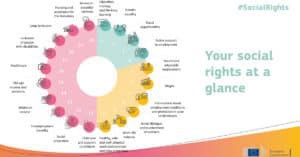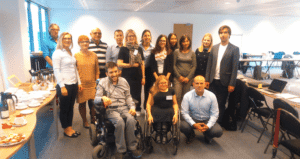On 26th June, Mr Mark Wheatley and Mr Alexandre Bloxs, respectively EUD Executive Director and EUD Policy Manager, attended the EU Disability Platform meeting that took place at the Charlemagne Building of the European Commission.
The European Disability Platform is an initiative launched by the EU Commission Directorate-General for Employment, Social Affairs and Inclusion (DG EMPL) to discuss relevant policy developments, exchange experiences and good practices, and reflect on the diversity of disability when implementing the EU Strategy on the Rights of Persons with Disabilities (ESRPD). It is one of the flagship initiatives of the ESRPD.
The membership of the Disability Platform is constituted of all EU Member States, 14 civil society organisations, including EUD, and European institutions. We all work together with the aim that persons with disabilities can fully enjoy their rights in line with the UN Convention on the Rights of Persons with Disabilities (UN CRPD).
The Platform has proven to be an excellent initiative to disseminate the newly released EUD policy recommendations, respectively on the European Disability Card and the Highest Attainable Standard of Health for Deaf People. EUD also seized the momentum of this event to highlight the barriers faced by deaf communities to full participation in all areas of EU society due to the lack of recognition of the EU national sign languages as EU official languages.
The European Commission also announced its plan to nominate an EU Candidate to the 2024 CRPD Committee election. The candidate will represent the EU as a regional institution and its 27 Member States. This is an unprecedented situation for both the EU and the UN CRPD Committee since the EU is the only regional organization having ratified the UN CRPD and has previously never nominated a candidate for the Committee’s elections. EUD deems it crucial to have a deaf sign language user as the EU CRPD Committee Candidate since the current composition of the Committee doesn’t comprise any deaf person and therefore doesn’t represent the diversity existing within the disability movement. The EU is now in a unique situation to act as a leader in promoting diversity and inclusion within the disability movement by nominating a deaf EU CRPD Committee candidate.
The EU is now in a pivotal position where it has the potential to take actions that can bring meaningful improvement in the life of EU citizens with disabilities, including the EU deaf community. A strong legally binding instrument on the European Disability Card is crucial to ensure the right of deaf people to freedom of movement within the EU is respected. Furthermore, this right can only be safeguarded if national sign languages are recognized as EU official languages which, in turn, will safeguard the full access of all deaf people in all areas of EU society, including in the highest attainable standard of health and the political participation of deaf people. Ultimately, nominating a deaf sign language user as the EU candidate for the CRPD Committee election would align with the continuity of the EU’s commitment in fostering inclusion and diversity.
A strong legally-binding instrument on the European Disability Card is crucial to ensure the right of deaf people to freedom of movement within the EU is respected. Furthermore, this right can only be safeguarded if national sign languages are recognized as EU official languages which, in turn, will safeguard the full access of all deaf people in all areas of EU society, including in the highest attainable standard of health and the political participation of deaf people.













